Enhancing Mental Well-Being: Exploring the 14 Core Domains of Good Mental Health
The World Health Organization defines mental health as a state of well-being that allows individuals to cope with life’s stresses, realize their abilities, learn and work effectively, and contribute to their community. As a fundamental aspect of health and well-being, mental health supports our capacity to make decisions, build relationships, and shapes how we view the world. Mental health is a basic human right, essential for personal, community, and socio-economic development.
When we talk about mental health as a society, we are often referring to mental illnesses, which can perpetuate stigma associated with mental health. Defining and operationalizing good mental health has been challenging to date. The European College of Neuropsychopharmacology Thematic Working Group on the Prevention of Mental Disorders and Mental Health Promotion addresses this issue in their manuscript by presenting a critical review of existing definitions of good mental health. They argue that establishing a clear and pragmatic definition is essential for standardizing research in this field.
Fusar-Poli et al. (2020) conducted a review to define and explore the fundamental aspects of mental health. They characterized good mental health as “a state of well-being that enables individuals to cope with life’s stresses and function productively.” Their review identified fourteen core domains that collectively define good mental health. These include mental health literacy, attitudes towards mental disorders, self-perceptions and values, cognitive skills, academic/occupational performance, emotions, behaviors, self-management strategies, social skills, family and significant relationships, physical health, sexual health, meaning in life, and quality of life. These domains are extensively documented in the literature and provide a framework for future empirical research aimed at enhancing mental health outcomes. Detailed descriptions of each domain, alongside potential assessment tools, are outlined below (Fusar-Poli et al., 2020).
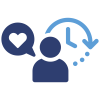
Health Literacy: The ability to recognize and understand various mental disorders, their contributing factors, warning signs, and available mental health resources is a key domain of mental health. Tools like the Mental Health Literacy Scale (MHLS), Depression Literacy questionnaire (D-Lit), and Questionnaire for Assessment of Mental Health Literacy (QuALiSMental) help assess this knowledge.

Attitude Towards Mental Disorder: Effective responses to individuals with mental disorders should be characterized by understanding, compassion, and empathy to reduce discrimination and social distance. Stigma, which manifests as negative attitudes and leads to discriminatory actions, must be addressed. Tools such as the Depression Stigma Scale (DSS), Generalized Anxiety Stigma Scale (GASS), and Stigma of Suicide Scale (SOSS) are essential for assessing these attitudes and informing strategies to combat stigma.

Self-Perceptions and Values: This domain encompasses subjective beliefs, values, and emotions about one’s internal and external characteristics, influencing attributional style, self-compassion, and self-esteem. These factors impact awareness, acceptance, and the ability to live a valued life. Tools like Rosenberg’s Self-Esteem Scale (RSES), The State Self-Esteem Scale (SSES), and the Self-Perception Profile for Children (SPPC) are used to assess these attributes.
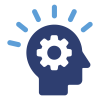
Cognitive Skills: This domain involves the ability to pay attention, remember, and organize information, alongside cognitive flexibility and focus for decision-making and problem-solving. Assessment tools include the Cognitive Assessment Battery (CAB), Trail Making Test (TMT), and Screen for Cognitive Impairment in Psychiatry (SCIP).

Academic/Occupational Performance: This domain encompasses objective learning, knowledge, study achievements, attendance, behavior, school adjustment, and academic adaptation. Assessment tools include the Teacher Report Form (TRF), Child Behavior Checklist (CBCL), and formal school grades.
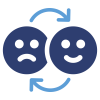
Emotions: This domain involves affective states with arousing or motivational properties that lead individuals to certain responses or behaviors. Assessment tools include the Emotion Expression Scale for Children (EESC), Emotional Intelligence Inventory (EII), and Emotion Regulation Questionnaire (ERQ).
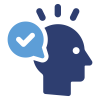
Behaviors: This domain refers to how individuals respond to stimuli through their actions and conduct. Key assessment tools include the Child Behavior Checklist (CBCL), Healthy Lifestyles Behavior Scale (HLBS), and The Drug Attitudes Scale (DAS).

Self-Management Strategies: This domain includes practical skills needed to independently care for oneself and meet environmental demands, such as coping with stress, problem-solving, and decision-making to handle adversities. Assessment tools include the Brief Resilient Coping Scale (BRCS), Children’s Coping Scale (CCS), and Children’s Coping Strategies Checklist (CCSC).
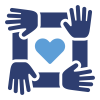
Social Skills: This domain encompasses the abilities that enable young people to interact and communicate effectively, fostering positive relationships. Assessment tools include the Social Competence Scale for Adolescents (SCSA), Social Skills Rating System (SSRS), and Social Skills Improvement System-Rating Scale (SSIS-RS-C).
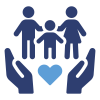
Family and Significant Relationships: This domain involves establishing meaningful and healthy relationships with family members, promoting positive communication and interaction within a supportive environment. Assessment tools include the Widowed Parenting Self-Efficacy Scale (WPSES), Inventory of Parent and Peer Attachment (IPPA), and Child Adjustment and Parent Efficacy Scale (CAPES).
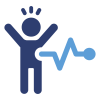
Physical Health: This domain includes physical variables, visible symptoms, and measures related to maintaining a positive physical status and overall physical health. Assessment tools include the Physical Health Questionnaire (PHQ), General Health Questionnaire (GHQ), and International Physical Activity Questionnaire (IPAQ).
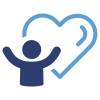
Sexual Health: This domain refers to a state of physical, emotional, mental, and social well-being related to sexuality. Assessment tools include the Sex Knowledge and Attitude Test (SKAT), General Sexual Knowledge Questionnaire (QSKQ), and Sexual Health Questionnaire (SHQ).
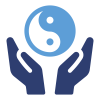
Meaning of Life: This domain involves the sense that life has purpose and significance. Assessment tools include the Meaning in Life Questionnaire, Purpose in Life Test, and Existential Concerns Questionnaire (ECQ).

Quality of Life: This domain encompasses a person’s general well-being, defined by health, happiness, and life satisfaction. Assessment tools include the Quality of Life Scale (QOLS), Satisfaction With Life Scale (SLS), KIDSCREEN, and WHO Quality of Life (WHOQOL).
Mental health is a spectrum that extends beyond the absence of illness, varying greatly among individuals. While conditions like mild anxiety or high-functioning depression can coexist with fulfilling lives and effective management of responsibilities, others managing ADHD, bipolar disorder, or schizophrenia may experience periods of stability and success. Effective treatment and support can facilitate a good quality of life in these cases.
Differentiating between good mental health and mental health promotion reveals distinct yet interconnected concepts. Good mental health encompasses positive aspects such as well-being, competence, and resilience, while mental health promotion involves strategies to enhance these qualities and increase awareness and control over mental health throughout one’s life. It also involves strengthening protective factors against mental disorders, beyond simply avoiding risk factors like childhood maltreatment, which, while crucial, do not alone define good mental health.
Fusar-Poli et al.’s (2020) review underscores the intricate nature of defining and promoting good mental health by identifying fourteen core domains essential for understanding mental well-being. These domains, including health literacy, attitudes towards mental disorders, self-perceptions, cognitive skills, and quality of life, provide a structured framework for assessing mental health and guiding strategies to enhance well-being and reduce stigma. Through ongoing empirical research and the use of effective assessment tools, we can deepen our understanding and support of mental health across diverse populations. This approach aims to foster resilience, competence, and overall well-being amidst life’s challenges, contributing to a society where mental health is universally valued, supported, and accessible.
Ready to Learn More:
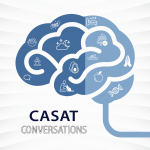 Listen now to Season 5 of CASAT Conversations, “A Holistic Look at Mental Health,” where we delve into thought-provoking conversations exploring the various dimensions of mental well-being. We explore the dynamic connections between physical, mental, emotional, and spiritual aspects of health, drawing on the latest scientific research, practices, and therapies. These discussions navigate the multifaceted landscape of mental health, empowering listeners to understand and embrace the interconnected nature of mental well-being. Listen now to deepen your understanding and support for mental health.
Listen now to Season 5 of CASAT Conversations, “A Holistic Look at Mental Health,” where we delve into thought-provoking conversations exploring the various dimensions of mental well-being. We explore the dynamic connections between physical, mental, emotional, and spiritual aspects of health, drawing on the latest scientific research, practices, and therapies. These discussions navigate the multifaceted landscape of mental health, empowering listeners to understand and embrace the interconnected nature of mental well-being. Listen now to deepen your understanding and support for mental health.
References
European College of Neuropsychopharmacology. (n.d.). Prevention of Mental Disorders and Mental Health Promotion Network. Retrieved July 9, 2024, from https://www.ecnp.eu/research-innovation/networks-thematic-working-groups/list-ecnp-networks/prevention-mental-disorders-and-mental-health-promotion
Fusar-Poli, P., Salazar de Pablo, G., De Micheli, A., Nieman, D. H., Correll, C. U., Kessing, L. V., Pfennig, A., Bechdolf, A., Borgwardt, S., Arango, C., & van Amelsvoort, T. (2020). What is good mental health? A scoping review. European Neuropsychopharmacology, 31, 33-46. https://doi.org/10.1016/j.euroneuro.2019.12.105
World Health Organization. (2022). Mental health: Fact sheet. https://www.who.int/news-room/fact-sheets/detail/mental-health-strengthening-our-response
Blog Post Tags:
Related Blog Posts
Related Learning Labs
Related Resources
.
- Buscar Tratamiento de Calidad para Trastornos de uso de Sustancia (Finding Quality Treatment for Substance Use Disorders Spanish Version)
- Finding Quality Treatment for Substance Use Disorders
- Focus On Prevention: Strategies and Programs to Prevent Substance Use
- Monthly Variation in Substance Use Initiation Among Full-Time College Students
- The National Survey on Drug Use and Health (NSDUH) Report: Monthly Variation in Substance Use Initiation Among Adolescents








